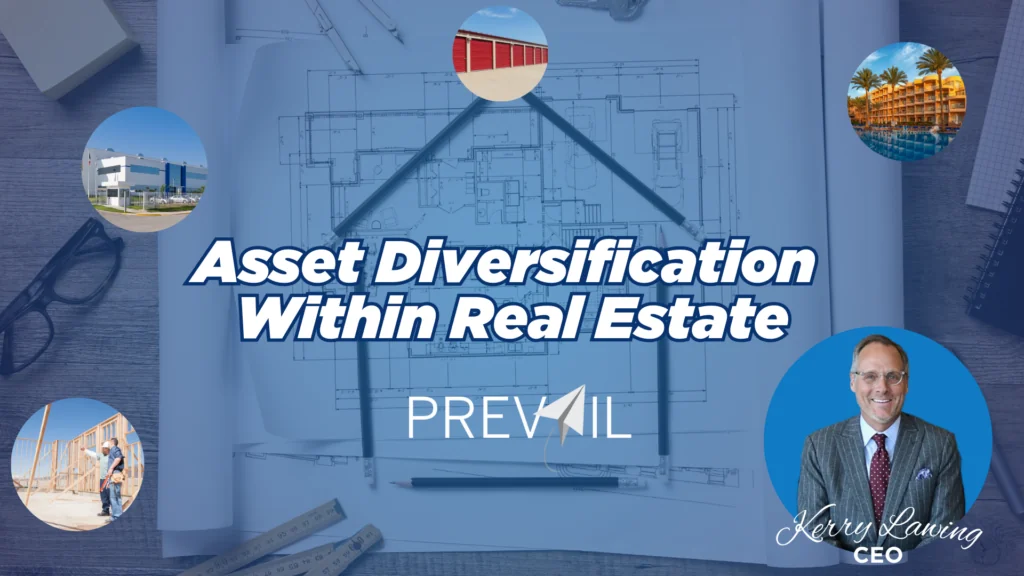You may be investing in real estate as a way to diversify your overall portfolio into an asset class that is generally non-correlated to the stock market, often pays dividends, can have significant tax benefits, and provide capital appreciation over time.
So, you may already subscribe to the theory of “not putting all of your eggs into one basket”. BUT, does that translate into your portfolio of real estate holdings as well? You might have gotten started with apartment complexes, for example, evolving from buying residential rental properties. Does it make sense to spread your capital around and invest in different types of real estate sub-classes?
Keep reading to learn a little bit more about diversifying within different types of commercial real estate.
Storage
Storage properties are a great addition to any real estate portfolio. By owning a storage property, you can offer your tenants a needed service and diversify your income stream.
Choosing a Storage Property – Storage properties are perfect for many different purposes, from personal storage to business storage. This versatility makes them a unique investment that can appeal to a wide range of tenants.
There are a few things to keep in mind when looking at storage properties:
- First, make sure the property is in a good location. It should be easily accessible for tenants and have a good amount of traffic.
- Second, remember to research the competition. There may be other storage properties in the area, so it’s essential to make sure the property can stand out and is competitive with the area.
- Finally, ensure there is a good marketing strategy in place. Promote your property to local businesses and individuals who may need additional storage space.
Storage property can be a great investment because it’s a necessity for many people and businesses. Storage units are generally set up on autopay to create a stable rent collection, and when units go into default, they can easily be auctioned off and quickly turned over. Storage property is also a relatively low-risk investment, as it’s not as vulnerable to economic downturns as other real estate investments.
Hotels
When most people think of real estate, they think of apartments and houses. But there’s another type of real estate where people stay that can help you diversify and its hotels.
Like other classes of real estate, hotels are a physical asset that can generate passive income. And like other types of real estate, the value of hotels can go up and down depending on the economy and the market.
But what makes hotels a particularly good investment is the fact that they tend to react differently during recessionary periods. People will always need a place to stay, even during tough times. And, a subcategory of hotels, extended stay properties, can deliver even more unique benefits. Extended stay properties tend rely much more heavily on business travel, often have lower operating expenses (no room service for example) and for the better run properties guests stay for up to a month at a time on average, driving occupancy rates much higher. Buying a hotel can give you a ready-made business with a customer base and a steady stream of income.
Choosing a Hotel – Of course, there are a few things to keep in mind when investing in hotels:
- First, the type of hotel. Are you looking for a full-service hotel with many amenities? Generally, these types of hotel properties are heavily dependent on travel and tourism and can be impacted by economic downturns. There are also select-service hotels which have a limited selection of amenities and are generally catered towards business travelers. And of course, extended stay properties. These types of hotels can weather economic downturns better as service/location-based industries will always need a space to house business travelers.
- Hotels can have exceptional cash-on-cash returns when compared to multifamily properties and other asset types. Since hotels operate on a nightly basis, they are able to charge a premium for their rates. Due to the fast turnover of rooms (compared to a multifamily property that typically has 1-year leases), hotels are able to always adjust their pricing to account for inflation, demand and other economic factors.
- But hotels can also be expensive to buy and operate. How agile are the operations of the specific hotel you are considering and are they able to easily pivot their operations to meet the occupancy of the hotel? The hotel management’s ability to adjust their operations can be a strong indicator of whether they will be able to navigate periods of lower occupancy.
If you can find a good hotel in a good location, it could be a great investment for your portfolio.
Industrial
Industrial properties are another subsector that can be a great way to diversify your real estate portfolio. Industrial properties are used for manufacturing, assembly, and distribution of goods. It also can be used for other various business purposes, including warehousing, light manufacturing, and research and development.
Industrial property tends to have a bit different investment risk profile than other sub classes. As a category, it is often less susceptible to market fluctuations than other types of real estate, making it a good choice for investors looking for stability. Tenants of industrial properties also tend to have low turnover because of the heavy investment corporate tenants make to set up their space for their specific business needs.
It is common for industrial properties to have NNN (triple net) leases, where utilities and other operating expenses can be passed through to a tenant. For example, a manufacturing plant may use a lot of energy to operate their equipment, and the tenant will be responsible for those expenses, not the landlord. These leases also give landlords (and investors like you) consistent and predictable income from the property.
Industrial properties can be a great investment for your business. It can be a stable, safe, and versatile option that can help you grow your business.
Build-To-Rent
With home prices on the rise, the build-to-rent (BTR) sector has been growing in the United States for the last few years. The build-to-rent sub class can both diversify your portfolio and provide a steady, long-term stream of rental income. In a build-to-rent property, the builder constructs a property with the intention to rent it out rather than sell it. These types of investments are held longer than most syndications and are generally held 7-10+ years.
A build-to-rent investment generally has little to no cash flow while the property is being developed, which can be anywhere from 1-2+ years. Once the BTR units start to get leased to tenants, you will be able to receive cash flow on a consistent basis.
Once a BTR community is sold, you can generally expect larger returns as the longer hold period would have provided for the mortgage to be paid down as well as a longer period of appreciation of the property itself.
BTR’s generally provide a steadier stream of rental income than a traditional buy-and-flip investment. Since the property is intended to be rented out long-term, the monthly payments come in on a regular basis, which can be helpful for budgeting and cash flow purposes.
By investing in a build-to-rent property, you can help spread your risk and minimize your exposure to any one market.
Short-Term Rentals
A short-term rental, also known as a vacation rental, is a property that’s rented out for less than a month. These properties can be a great way to diversify your real estate portfolio and generate additional income.
Choosing a Short-Term Rental Property – There are a few things you need to consider before investing in a short-term rental property:
- Location, location, location. Short-term rentals are typically used for tourism and traveling. A property located in a central or unique area will give you a competitive edge over nearby properties. Can you walk to town in a nice neighborhood? Are you near a national park or attraction? Do you have exceptional views or a lot of privacy? These are all questions you may want to consider depending on the market you are looking into.
- You need to decide if you want to manage the property yourself or hire a property manager. Property managers can be helpful, but they can also be expensive.
- You also need to decide what kind of property to buy. A single-family home or condo with two or three bedrooms is a good option for a short-term rental. You can also buy a property that’s already set up as a short-term rental, such as a beach house or ski lodge.
- Check the local regulations on short-term rentals, as there can be very strict regulations depending on the market you are looking at.
- Will you want to use the property? Many times, investors will purchase a short-term rental that they intend to use for a part of the year.
- Properties that are well-designed and include amenities such as Wi-Fi and TV will also be in higher demand.
In a world where people are constantly on the go and able to work remotely, the short-term rental market is booming. People are looking for a place to stay for a night, a week, or a month, and they’re willing to pay a premium for it. This presents a great opportunity for investors who are looking to diversify their portfolio with another real estate asset and the ability to achieve high cash flow.
Diversifying Your Real Estate Holdings
Here at Prevail Real Estate, we not only believe that diversifying your entire portfolio into real estate is important, but we also believe that within your real estate holdings themselves, you should consider diversifying. Don’t just put all of your real estate investments in one property, invest in multiple properties, in multiple geographies in multiple subclasses like industrial, medical and hospitality.
Call or email us if you would like to discuss more about what options you may have available.
📞 Phone (913) 295-9500
✉️ Email: riseabove@prevailiws.com
This is not an offer to sell securities. This article should be construed as informational and not as an advertisement soliciting for any particular purpose.


















